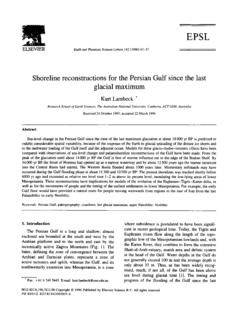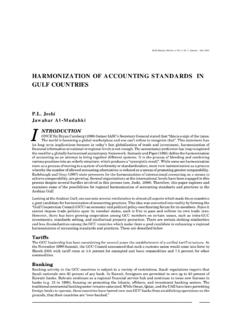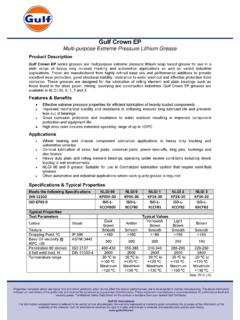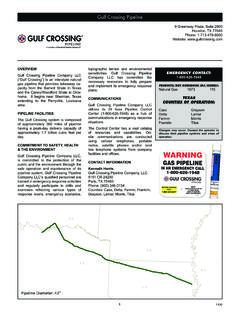Transcription of Gulf Security: Between Balance of Power and Collective ...
1 Al-Jisr Project on EU-GCC Public Diplomacy and Outreach Workshop The EU-GCC Partnership security and Policy Challenges Berlin, March 16-17, 2010. Conference Overview Paper Compiled by the Center for Applied Policy Research (C A P) and the gulf Research Center (GRC). gulf security : Between Balance of Power and Collective security The following paper provides an overview of the political as well as the academic proposals for organizing cooperation and security affairs in the gulf . Given the frequency of major wars, its abundance of natural resources and its pivotal geopolitical location, this region is not only a political and security hot spot of great strategic importance, it is also particularly interesting for scholars of international relations who, historically, have understood this region as a realpolitik, Balance of Power system, par-excellence.
2 The gulf can be conceptualized as a sub-complex of the greater-Middle Eastern regional system with its own distinct security political practices and challenges. It includes three regional great powers, Iran, Iraq and Saudi Arabia, as well as regional small powers, such as Kuwait, Bahrain, Qatar, the United Arab Emirates and Oman. Somewhat on the regional margins is Yemen, often regarded as a fragile state more concerned with its own domestic affairs than regional or international politics. Since the emergence of the gulf region as a strategic, geographic space, it has also gained a prominent place on the international security agenda; for this reason, various external actors continuously played an important role in regional affairs.
3 After the First World War, the UK was the main actor in terms of ensuring regional stability and guaranteeing Western strategic interests. Following the British withdrawal from its territories East of Suez' in the early 1970s, the US took over this role as external balancer, cooperating with regional allies but also becoming ever-more militarily engaged in order to preserve the gulf 's precarious stability. A series of critical events, the end of the Iran-Iraq War in 1988, Saddam Hussein's invasion of Kuwait, and the resultant US Operation Desert Storm, intensified American engagement and led to the permanent stationing of troops in the region.
4 Subsequently, the US introduced a policy of dual-containment--an attempt to maintain regional stability by keeping both Iraq and Iran in check. gulf security : Between Balance of Power and Regional Cooperation -1- After the terrorist attacks of September 11, 2001 and with the increasing influence of neoconservative thinking in Washington, active regime change in Iraq became a viable option that was quickly formulated and ultimately implemented. The 2003, US-led invasion of Iraq removed Saddam Hussein.
5 For Washington policy-makers, it was envisaged that Saddam's regime would be replaced by a liberal and democratic government that would serve as an example for other countries in the region, essentially generating a democratic domino-effect. The failure of this strategy, however, became quickly apparent as it led to chaos and civil war-like conditions in Iraq and resulted in the final dismantling of the Balance of Power in the gulf . Throughout this period, there were efforts to at least think about and begin to formulate concepts of regional cooperation that could be used to escape the perennial cycle of instability that was defining the gulf region.
6 None of these ideas went farther than the drawing board or were seriously considered for implementation by the respective regional stakeholders, however. As a result, a new security architecture must take into account the failures of the past and consider the strategic circumstances that presently exist. The necessity to continue thinking about and discussing a regional security framework is underlined by the numerous security problems that challenge not only the gulf , but that also have implications for peace and security beyond the region itself: First, the domestic situation in Iraq is far from stable and the country's future regional role still needs to be determined.
7 Second, Iran's opaque foreign policy and its disputed nuclear and missile programs have generated suspicions among its neighbors and the international community as to its regional ambitions; third, there is a fear that the Sunni-Shia divide is deepening which would have destabilizing political and social effects on the region; fourth, the stability of Yemen concerns all regional actors, in particular the countries of the GCC; finally, border disputes in the region, most prominently Between the UAE and Iran, must be resolved; in addition to these concerns, the region must also address cross-cutting security challenges such as terrorism, drug trafficking and piracy.
8 This paper provides an overview of the various proposals and ideas that have been put forward concerning potential options for resolving the gulf security dilemma. Looking at the list below, it becomes clear that most of the concerned parties agree that a return to the status quo ante ( the old realpolitik Balance -of- Power approach which depends on the US to guarantee regional stability) is no longer workable and that in order to overcome regional challenges, cooperation is needed. Given that the region suffers from political and ideological conflicts and a lack of trust among the involved actors, finding a way to operationalize even minimal cooperation is no easy task.
9 Most parties suggest that any new security agenda should be more inclusive, that it addresses not only military aspects of security , but also issues such as regional economic development, counterterrorism, disaster response, and environmental, social and cultural topics as well. In gulf security : Between Balance of Power and Regional Cooperation -2- addition, a more cooperative approach to inter-state relations as a basis for a new regional security architecture is called for, as this is essential to an understanding of security that leaves behind zero-sum calculations of national security .
10 Yet, whereas it has been possible to achieve some form of agreement across the region and beyond regarding the general aim ( regional peace and stability), the actual shape of, and the practical means for establishing this new security architecture remain unresolved. As can be seen from the proposals below, there are diverging suggestions as to the basic design, the rules and the participants. Differing views pertain in particular to the following questions: - What degree of institutionalization and which modus operandi would be appropriate for this sub-regional security system?





